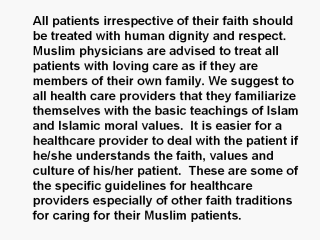| front |1 |2 |3 |4 |5 |6 |7 |8 |9 |10 |11 |12 |13 |14 |15 |16 |17 |18 |19 |20 |21 |22 |review |
 |
Muslim
patients should be identified if possible as Muslim (or with the religion
Islam) in the registration information so as to prevent any mistakes
happening unintentionally in terms of violating dietary rules or privacy.
Their care providers should respect their modesty and privacy. Muslim patients, particularly women may need a special gown to cover the whole body in order to avoid unnecessary exposure during physical examination. Some examinations may be done over the gown. Provide Muslim patients Islamically slaughtered (Dhabiha) meat. Muslim patients should not be served any pork, pork products or alcohol in their meals. A Muslim patientís family may be allowed to bring food from home, as long as it is meeting the patientís dietary restrictions. Make it easy for Muslim patients to perform Islamic prayers if they can. Inform them of their rights as a patient and encourage an Islamic living will. (A sample of a living will is enclosed). Take time to explain test procedures and treatment. Some of the more recently immigrated Muslims may have a language problem. Muslim women can give consent for any treatment or procedure. Allow their Imam (religious teacher) to visit them and pray for them. Clerics of other faith traditions can pray for or with Muslim patients with their permission, using non denominational words like God. Autopsy is permitted if medically indicated or required by law. Organ donation is permitted with some guidelines and is encouraged. Always examine a female patient in the presence of another female (chaperon) or a female relative (except in medical emergencies). Especially for labor and delivery, if the patientís obstetrician is unavailable and upon her request, provide a female healthcare provider, if feasible. Her husband is encouraged to be present during the delivery. After death of a Muslim patient in a health care facility, allow the family and Imam to arrange for preparing the dead body for burial under Islamic guidelines. A corpse should be given the same respect and privacy as he/she was receiving while alive. Muslim relatives and friends of the dead are encouraged to stay in the room where the dead body is kept to recite Quríān. Muslim corpses are not embalmed. |